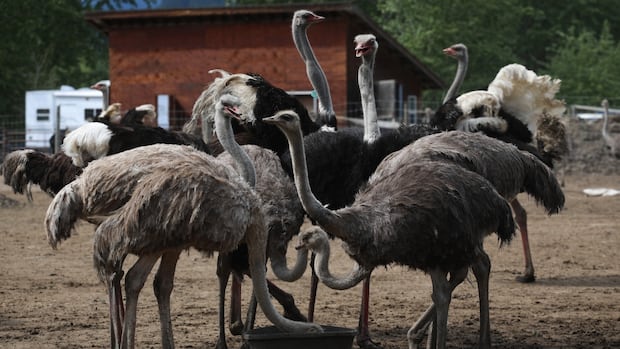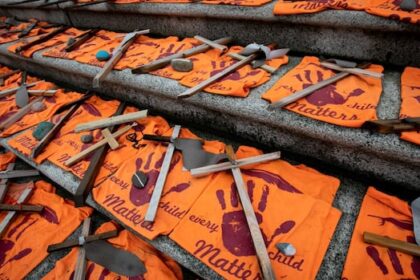After chasing debts through the courts, creditors of a high-profile ostrich farm in southeastern B.C. are hoping the Canada Food Inspection Agency (CFIA) will help them recoup hundreds of thousands of dollars in the event of a cull.CFIA wants to destroy more than 300 birds belonging to Universal Ostrich Farms Inc., located in Edgewood, B.C., nearly nearly 100 kilometres east of Kelowna, because of the threat of avian flu, which was detected in some of the animals last December.As the farm has sought public support and donations for a federal court battle to keep the flock alive, creditors claim the business owners have ignored B.C. Supreme Court orders to repay debts worth more than $250,000.As a result, two creditors have attempted to garnishee the CFIA in a bid to intercept any compensation issued to the ostrich farm if Canada’s top court allows the slaughter to go ahead, and a third says he intends to follow suit.”It’s a very unique situation here at the moment,” said Steven Cope, a lawyer for a pair of Fort St. John businessmen who obtained a $140,000 judgment against Universal Ostrich last May.”The only [asset that can be levied or taxed] that they have are two-legged animals that are under quarantine facing a death penalty. It’s a very rare situation.”‘All funds raised are directed transparently’A CFIA order to destroy Universal Ostrich Farms’ birds is currently on hold as the Supreme Court of Canada considers the farm’s application to appeal the agency’s directive — first issued in December 2024.Cope’s clients are among three creditors who have sued Universal in the past two years — shining a light on a troubled financial history the farm’s owners insist is separate from the legal battle over the flock’s fate.Dave Bilinski and Karen Espersen of Universal Ostrich Farms pose with their birds earlier this year. Their company owes thousands to creditors who are looking to collect from the CFIA in the event of a cull. (Brady Strachan/CBC)”[The civil matters] are unrelated to the CFIA’s actions or to the core issue at hand — the preservation of these healthy ostriches and their importance to science, food security, and humanity,” farm owners Karen Espersen and Dave Bilinski said in an email to CBC News.”Legal and financial matters with private individuals are before the courts and we will continue to follow due process.”Universal’s website features four “donate” buttons, which lead to a page claiming that nearly 2,000 people have donated more than $131,000 toward a goal of $200,000 to “help cover legal and operational expenses.”Espersen and Bilinski say the money will be used for its intended purposes.”We can assure supporters and the public that all funds raised are directed transparently toward legal costs and the ongoing care of the ostriches during this prolonged quarantine,” the farm’s statement says.”Our priority remains ensuring these animals are fed, housed, protected, and represented in court.”Ostrich oil in lieu of compensationCope’s clients — Rudi George and Roman Stadler, who are together one of the creditors — sued Universal Ostrich Farms last February in relation to a deal that saw the businessmen supply the farm with $126,399 worth of ostriches. They claim to have received only $5,000 in return.According to B.C. Supreme Court documents, another creditor, David Goranson, sued Universal in August 2023 over repayment of a $60,000 loan issued the previous year to “fund the operation and expansion” of the business.Three creditors of Universal Ostrich Farms have obtained orders from B.C. Supreme Court in relation to a combined total of quarter of million dollars worth of debt. (Peter Scobie/CBC)Court documents include emails from 2023 between Goranson and Universal in which Bilinski and Espersen claim to “have some really good things going on for the business that will make 2023 a game changer for the farm.””As you know Covid-19 hit us very hard but we have survived and the future looks very bright for the ostrich industry,” the farm’s owners wrote.In a response to Goranson’s lawsuit, Universal Ostrich Farms admitted to falling behind on interest payments, but say they were not in breach of the loan.”To compensate for any feelings of damage or temporary loss David Goranson asked for and received ostrich oil products for free from Universal Ostrich Farms Inc. many times,” the reply says.Goranson obtained a judgment for more than $80,000 against Universal Ostrich in May 2024.”It is unclear to Mr. Goranson why this obligation has not been met,” Goranson’s lawyer said in a statement to CBC News.”And it is frustrating to him that the judgment is not being paid.”Goranson has also served the CFIA with a garnisheeing order.The B.C. Supreme Court file contains a letter from the agency dated last January, disputing the order on the grounds that, basically, no decision has been made on compensation.’Severe economic harm’The farm’s finances have arisen in the CFIA court battle as background to the case and as part of arguments over the “irreparable harm” Espersen and Bilinski have argued they would suffer if the cull goes ahead.In court documents, Bilinski claims the business was engaged in the sale of ostriches for “breeding purposes, some meat processing, ostrich oil skin care products and agritourism” until March 2020.Creditors of Universal Ostrich Farms have filed garnisheeing orders against the Canadian Food Inspection Agency in the hopes of intercepting any money the agency issues in the event of a cull of Universal’s birds. (Sean Kilpatrick/The Canadian Press)But by the end of that year, Bilinski said the farm’s operations “became entirely dedicated to scientific research” in collaboration with a Japanese scientist known as Dr. Ostrich, who studies antibodies in ostrich egg yolks said to block infectious diseases.In arguments at the Federal Court of Appeal, the CFIA claimed the farm owners “submitted no evidence establishing that it has ever been engaged in a profitable antibody production business and that its evidence of irreparable harm relates to speculative future profits.”Regardless, the appeal court judge accepted that “the destruction of the appellant’s flock would seriously disrupt its business operations [and] cause it severe economic loss.”According to court filings, in the event of a cull, the Health of Animals Act would limit compensation to $3,000 per bird — but the scheme is tied to compliance with CFIA directives that encourage “timely cooperation with the Agency’s disease control measures.”Cope says his clients garnisheed the company’s bank accounts, which came up empty, and they tried to garnishee the CFIA. He said the agency’s lawyer has been very helpful, but no decision has been made on compensation, so no debt is due yet to the ostrich owners.At the moment, Cope says the only assets the principals of Universal Ostrich Farms appear to have are their birds — which leaves their creditors in an unusual position.”Really, the only thing we could do is get a writ of seizure and sale on the ostriches, but they’re under quarantine, so that’s a very bad path,” he says.”So we are waiting to see which way the CFIA is going to move and the courts are going to move.”‘They’re not being raised to be pets’Ariton Talica is the third creditor to sue Universal Ostrich Farms in B.C. Supreme Court. He said he plans to serve a garnisheeing order on the CFIA this week in relation to a $30,677 judgment he obtained against Universal Ostrich Farms in October 2023.According to court documents, Talica agreed to buy six ostriches for $45,000 in 2017 but ran into problems trying to house them, which led to a situation where Universal kept his birds on a consignment basis.In a response, the farm owners said they paid “room and board for Ariton’s ostriches.” They also claimed they “felt we had a deal coming up and could pay him out. The deal is still coming together but unfortunately is still taking time.”Talica, who works as a tile fitter, said he’s not a rich man. He said he was sold on a scheme that would have seen Universal Ostrich Farms buy the chicks that his birds — breeding hens — produced.And he wasn’t under the impression they were being raised for research.”I think people have pity for the birds … but let’s be realistic. If the government aren’t going to kill their birds, the next day, me and the other guys they owe money to are going to be there and take most of their birds,” Talica told CBC News.”So they’re going to be slaughtered anyway. So either way, the birds are being raised to be slaughtered, they’re not being raised to be pets.”
Creditors circle as cull controversy shines light on B.C. ostrich farmers’ unpaid bills











